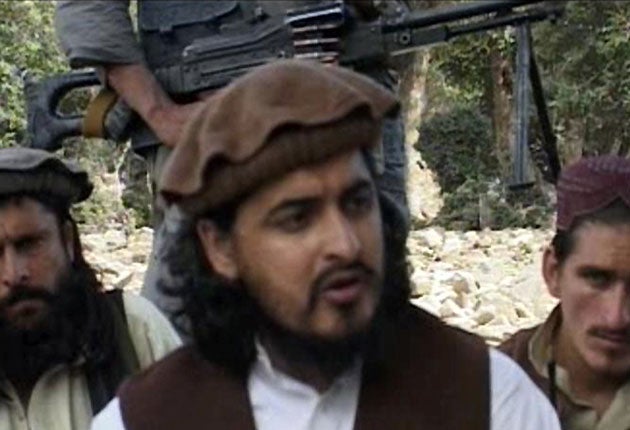US drone 'targets Pakistan Taliban chief'

Your support helps us to tell the story
From reproductive rights to climate change to Big Tech, The Independent is on the ground when the story is developing. Whether it's investigating the financials of Elon Musk's pro-Trump PAC or producing our latest documentary, 'The A Word', which shines a light on the American women fighting for reproductive rights, we know how important it is to parse out the facts from the messaging.
At such a critical moment in US history, we need reporters on the ground. Your donation allows us to keep sending journalists to speak to both sides of the story.
The Independent is trusted by Americans across the entire political spectrum. And unlike many other quality news outlets, we choose not to lock Americans out of our reporting and analysis with paywalls. We believe quality journalism should be available to everyone, paid for by those who can afford it.
Your support makes all the difference.A US drone fired two missiles today at a compound in northwest Pakistan where Pakistani Taliban chief Hakimullah Mehsud was believed to have been, but his fate was not known, Pakistani officials said.
If Hakimullah was killed, it could provide a much-needed boost to both Pakistan and the United States, which lost seven CIA employees to a suicide bomber in Afghanistan on 30 December, the second deadliest attack in the agency's history.
The Tehrik-e-Taliban Pakistan (TTP), or Taliban Movement of Pakistan, leader is the number one enemy of Pakistan, a long-time ally that the United States sees as a front-line state in its war against militancy, especially in neighbouring Afghanistan.
While Hakimullah's death, if confirmed, could lead to short-term disarray in the ranks of the Pakistani Taliban, it would be unlikely to be a long-term setback for the group fighting to topple the pro-American government.
It was not the first time Hakimullah Mehsud had been reported killed. The government said in August he had been killed in a Taliban power struggle after his predecessor Baitullah Mehsud's death.
"Local people are saying he was there at the time. We don't know if he was hit or not, if he's dead or alive," a senior Pakistani security official said.
Taliban spokesman Azam Tariq denied the reports of Hakimullah's death.
"He is safe. These are just rumours. He was not there when the attack took place," Tariq told Reuters by telephone from an undisclosed location.
A Pakistan military spokesman said he had no information about the Taliban chief.
Analysts said in the event of Hakimullah's death, another militant would take his place, just as he replaced Baitullah Mehsud, who was killed in a US drone attack last year.
Baitullah rose to prominence after militant commander Nek Mohammad was killed in a drone strike in 2004.
A likely successor would be Hakimullah's deputy, Wali-ur-Rehman, who is in charge of Pakistani Taliban forces in South Waziristan. The former teacher is considered more sober and astute than the brash Hakimullah, who has a reputation of being an especially brutal leader.
Twelve militants were killed in the drone strike on a compound on the border between the North and South Waziristan ethnic Pashtun tribal regions, near the Afghan frontier, the officials said.
Ten days after the attack on the CIA at a US base in Afghanistan, a Pakistani television station showed a video of Hakimullah sitting with a weapon in his lap beside the suicide bomber, who called for revenge attacks in and outside the United States for the death of Baitullah.
The clips raised Hakimullah's profile and created the impression that the al Qaeda-linked TTP played a major role in an attack that exposed huge flaws in US intelligence gathering.
While the TTP may have become more ambitious - it has focused on fighting the Pakistani state - analysts say its capabilities are probably limited to providing logistical support for militants like the bomber, Humam Khalil Abu Mulal al-Balawi. The drone attacks are a volatile issue in Pakistan.
Pakistan officially objects to the strikes against militants along its northwest, saying they violate its sovereignty. The attacks have also created fierce anti-US sentiment in Pakistan.
Pakistani Foreign Minister Shah Mehmood Qureshi said after meeting US Special Representative for Afghanistan and Pakistan Richard Holbrooke on Wednesday that any intensified US drone strikes or US special forces in Pakistan would threaten ties between the long-time allies.
US officials say the drones are an effective weapon against militants.
The United States has stepped up its drone attacks since the double agent blew himself up inside Forward Operating Base Chapman, a well-fortified US compound in Khost province in southeast Afghanistan
Hakimullah Mehsud's whereabouts have not been known since the Pakistani army launched an offensive in his South Waziristan bastion in mid-October and captured his strongholds.
Join our commenting forum
Join thought-provoking conversations, follow other Independent readers and see their replies
Comments